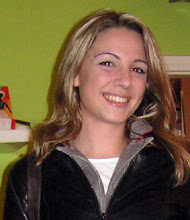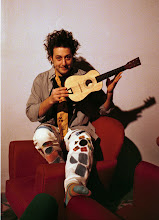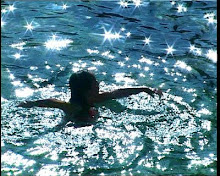 How many of you out there remember Steve Martin, stand-up comic ? That absurdist in the white three-piece suit who -- as he was leading audience singalongs -- would say:
How many of you out there remember Steve Martin, stand-up comic ? That absurdist in the white three-piece suit who -- as he was leading audience singalongs -- would say:This half of the room! Beautiful! Now this half! Good, good! All right, two fifths! Now, three-fifths! Good. Seven-ninths! Two-ninths! Okay, in Chinese now!
Or -- better yet -- how about those ditties (like his "Grandmother's Song") that Steve wanted us all to sing along with. Which featured lyrics like:
Be thoughtful and trustful and childlike,Be witty and happy and wise,Be honest and love all your neighbors,Be obsequious, purple, and clairvoyant. It's kind of hard now to explain what a seismic event it was when Steve Martin first came on the comedy scene in the 1970s. What he was doing back then was so new, so fearless (I still remember the sheer audacity of Martin's act. When -- as he began doing stand-up in 10,000 - 15,000 seat arenas -- Steve would turn to the audience and say: "Now, for those of you in the back of the house, my famous hidden dime trick. Which hand?") that it just took your breath away.
I did stand-up comedy for eighteen years. Ten of those years were spent learning, four years were spent refining, and four were spent in wild success. My most persistent memory of stand-up is of my mouth being in the present and my mind being in the future: the mouth speaking the line, the body delivering the gesture, while the mind looks back, observing, analyzing, judging, worrying, and then deciding when and what to say next. Enjoyment while performing was rare-enjoyment would have been an indulgent loss of focus that comedy cannot afford. After the shows, however, I experienced long hours of elation or misery depending on how the show went, because doing comedy alone onstage is the ego's last stand.
My decade is the seventies, with several years extending on either side. Though my general recall of the period is precise, my memory of specific shows is faint. I stood onstage, blinded by lights, looking into blackness, which made every place the same. Darkness is essential: If light is thrown on the audience, they don't laugh; I might as well have told them to sit still and be quiet. The audience necessarily remained a thing unseen except for a few front rows, where one sourpuss could send me into panic and desperation. The comedian's slang for a successful show is "I murdered them," which I'm sure came about because you finally realize that the audience is capable of murdering you.
Stand-up is seldom performed in ideal circumstances. Comedy's enemy is distraction, and rarely do comedians get a pristine performing environment. I worried about the sound system, ambient noise, hecklers, drunks, lighting, sudden clangs, latecomers, and loud talkers, not to mention the nagging concern "Is this funny?" Yet the seedier the circumstances, the funnier one can be. I suppose these worries keep the mind sharp and the senses active. I can remember instantly retiming a punch line to fit around the crash of a dropped glass of wine, or raising my voice to cover a patron's ill-timed sneeze, seemingly microseconds before the interruption happened.
I was seeking comic originality, and fame fell on me as a by-product. The course was more plodding than heroic: I did not strive valiantly against doubters but took incremental steps studded with a few intuitive leaps. I was not naturally talented-I didn't sing, dance, or act-though working around that minor detail made me inventive. I was not self-destructive, though I almost destroyed myself. In the end, I turned away from stand-up with a tired swivel of my head and never looked back, until now. A few years ago, I began researching and recalling the details of this crucial part of my professional life-which inevitably touches upon my personal life-and was reminded why I did stand-up and why I walked away.

In a sense, this book is not an autobiography but a biography, because I am writing about someone I used to know. Yes, these events are true, yet sometimes they seemed to have happened to someone else, and I often felt like a curious onlooker or someone trying to remember a dream. I ignored my stand-up career for twenty-five years, but now, having finished this memoir, I view this time with surprising warmth. One can have, it turns out, an affection for the war years.
From BORN STANDING UP: A COMIC'S LIFE by Steve Martin.
And then suddenly it was all over. Martin stopped doing stand-up and then began concentrating on making movies and writing.
Don't get me wrong, folks. I'm not complaining. I'm still a huge fan of Steve's film work. "Roxanne " (Which Martin wrote) is a sweet little gem of a movie. Likewise his valentine to living in Los Angeles, "LA Story." And who can forget "The Jerk," with all of its great little absurd bits (Mexican cat juggling, anyone?) as well as its brilliant extended set pieces ("I don't need anything. Just this ashtray and this paddle game and the remote control ...")?
I'm also extremely fond of the plays that Steve has written (like "Picasso at the Lapin Agile" and "The Underpants ") as well as Martin's novels ("Shopgirl" and "Pleasure of My Company") and that collection of his short stories ("Pure Drivel").
But that said, I still miss Steve Martin, stand-up comic. More importantly, I'd always wondered why -- when this guy was white-hot, working at the very top of his game -- he just ... stopped.
Well, I finally got an answer to that question when I read Martin's memoir, "Born Standing Up: A Comic's Life " (Scribner, November 2007). Which Steve describes as being " ... not an autobiography but a biography, because I am writing about someone I used to know."
But better than that, thanks to this beautifully written book, I now have a much better understanding where Steve Martin came from. More importantly, how he came to be such a unique talent.
Of course, to hear Steve tell the tale, he owes a lot of his success to the days he spent at Disneyland as a 10-year-old guidebook salesman. Once he's sold all of his books for that day, the young Martin would hurry on over to ...
... Pepsi Cola's Golden Horseshoe in Frontierland, where Wally Boag, the first comedian I ever saw in person, plied a hilarious trade of gags and offbeat skills such as gun twirling and balloon animals, and brought the house down when he turned his wig around backwards. He wowed the audience every
"Born Standing Up: A Comic's Life" isn't your usual show biz bio. In that it doesn't feature any juicy gossip or lurid behind-the-scenes stories. But what it does have is some really beautiful writing. Take -- for example -- this section of the book. Which describes that day when Martin -- long after he made a name for himself in stand-up and the movies -- felt compelled to return to Knotts and make one last visit to the Bird Cage.
I tugged at the theater door; it was locked. I was about to give up when I remembered a back entrance in the employees-only area, a clunky, oversized wooden gate that rarely locked because it was so rickety. I sneaked behind the theater and opened the door, which, for the millionth time, had failed to latch. The darkened theater flooded with sunlight, and I stepped inside and quickly shut the door. Light filtered in from the canvas roof, giving the bird cage a dim, golden hue. There I was, standing in a memory frozen in amber, and I experienced an overwhe lming rush of sadness.
lming rush of sadness.
time.
Even When You’re a Star, Comedy Isn’t in his lean, incisive new book about the trajectory of his life in comedy, Steve Martin describes some of the danger signs that made him realize his career in stand-up had peaked. In 1979 he was booked solid for the next two years and playing auditoriums too large for his sly, intimate stage act to be understood. And the critical backlash had begun: he had gone from being a wild and crazy guy, in his own phrase, to “a mild and lazy guy” in the none-too-original minds of reviewers.
.........When he went to a hospital in the midst of one of the panic attacks he had begun suffering, a nurse asked him to autograph a printout of his EKG. When he spoke with friends, conversations “often degenerated into deadening nephew autograph requests.” He was perceived to be so funny that he might get a laugh simply by asking, “What time does the movie start?” And he could take a woman to dinner and discover that yes, she had a boyfriend — and the boyfriend liked the idea of her dating a comedy star.By 1981, he writes, “my act was like an overly plumed bird whose next evolutionary step was extinction.” And he deserves credit for not having beaten that poor, tired, figurative bird into the ground. Perhaps it was a methodical approach to humor that saved him. “Born Standing Up” does a sharp-witted job of breaking down the step-by-step process that brought him from Disneyland, where he spent his version of a Dickensian childhood as a schoolboy employee, to both the pinnacle of stardom and the brink of disaster. Since then, he has spent more than 25 years using fiction, plays, movies, short humor essays and albums to escape the professional inertia that nearly led to his undoing.
Mr. Martin describes “Born Standing Up” as a biography rather than an autobiography, “because I am writing about someone I used to know.” He need not specify that he has spent years dissecting that long-lost someone, since this book is written in the straight-from-the-couch voice of a dutiful analysand. That does not make Mr. Martin myopic or dull; it simply gives him more than the usual degree of insight into why his sense of humor evolved the way that it did. Sure, he had a father who told a newspaper that “Saturday Night Live” (on which Mr. Martin has appeared many times) was the worst thing on television and whose own thwarted ambitions as a performer led to stone-faced disapproval of his son’s success. But the younger Mr. Martin is more interested in gaining insight than in settling scores.
Born in 1945, Mr. Martin grew up at a pivotal time in comedy history. As a boy he loved the lariat tricks and gimmicky props (most notably the arrow-through-the-head device, which would turn up on room-service waiters trying to amuse him in his adult superstar days) that were the epitome of that era’s magic acts. But he also grew up with a sense of imminent change.
With Mike Nichols, Elaine May, Lenny Bruce and Mort Sahl to listen to, not to mention E. E. Cummings and Lewis Carroll to read, he developed an eagerness to experiment with new premises for how the comic and the audience might interact. “I have decided my act is going to go avant-garde,” he wrote to a girlfriend in 1966. Though he claims that he still does not know what that meant, his book is fearless in charting the awkward stages of his comic breakthrough.
After early stints at such unpromising places as Knott’s Berry Farm, Mr. Martin (who grew up two miles from Disneyland, which he refers to as his version of Versailles) wound up footloose in San Francisco. One early job simply called for him to be onstage in a comedy club so passers-by on the street would think something was going on indoors. But in such anything-goes settings, he was free to ask himself interesting questions about how jokes worked: “What if there were no punch lines? What if there were no indicators? What if I created tension and never released it?” Although some of his answers, as reprinted here, are decidedly unfunny, Mr. Martin was able to concoct an unusual comic strategy. “And for the next eight years, I rolled it up a hill like Sisyphus,” he recalls.
Eventually he would ditch the turquoise and adopt a white three-piece suit for his stage act. He had the same kinds of lucid reasons for this as he did for other pivotal decisions. He wanted to be visible from a distance. He wanted a vest to keep his shirt from coming loose. He wanted to escape the politics of the period, finding it funnier to look “like a visitor from the straight world who had gone seriously awry.” And he wanted to honor a piece of advice about audiences that he had heard early on: “Always look better than they do.”
Don't get me wrong, folks. I'm not complaining. I'm still a huge fan of Steve's film work. "Roxanne " (Which Martin wrote) is a sweet little gem of a movie. Likewise his valentine to living in Los Angeles, "LA Story." And who can forget "The Jerk," with all of its great little absurd bits (Mexican cat juggling, anyone?) as well as its brilliant extended set pieces ("I don't need anything. Just this ashtray and this paddle game and the remote control ...")?
I'm also extremely fond of the plays that Steve has written (like "Picasso at the Lapin Agile" and "The Underpants ") as well as Martin's novels ("Shopgirl" and "Pleasure of My Company") and that collection of his short stories ("Pure Drivel").
But that said, I still miss Steve Martin, stand-up comic. More importantly, I'd always wondered why -- when this guy was white-hot, working at the very top of his game -- he just ... stopped.
Well, I finally got an answer to that question when I read Martin's memoir, "Born Standing Up: A Comic's Life " (Scribner, November 2007). Which Steve describes as being " ... not an autobiography but a biography, because I am writing about someone I used to know."
But better than that, thanks to this beautifully written book, I now have a much better understanding where Steve Martin came from. More importantly, how he came to be such a unique talent.
Of course, to hear Steve tell the tale, he owes a lot of his success to the days he spent at Disneyland as a 10-year-old guidebook salesman. Once he's sold all of his books for that day, the young Martin would hurry on over to ...
... Pepsi Cola's Golden Horseshoe in Frontierland, where Wally Boag, the first comedian I ever saw in person, plied a hilarious trade of gags and offbeat skills such as gun twirling and balloon animals, and brought the house down when he turned his wig around backwards. He wowed the audience every
"Born Standing Up: A Comic's Life" isn't your usual show biz bio. In that it doesn't feature any juicy gossip or lurid behind-the-scenes stories. But what it does have is some really beautiful writing. Take -- for example -- this section of the book. Which describes that day when Martin -- long after he made a name for himself in stand-up and the movies -- felt compelled to return to Knotts and make one last visit to the Bird Cage.
I tugged at the theater door; it was locked. I was about to give up when I remembered a back entrance in the employees-only area, a clunky, oversized wooden gate that rarely locked because it was so rickety. I sneaked behind the theater and opened the door, which, for the millionth time, had failed to latch. The darkened theater flooded with sunlight, and I stepped inside and quickly shut the door. Light filtered in from the canvas roof, giving the bird cage a dim, golden hue. There I was, standing in a memory frozen in amber, and I experienced an overwhe
 lming rush of sadness.
lming rush of sadness.time.
Even When You’re a Star, Comedy Isn’t in his lean, incisive new book about the trajectory of his life in comedy, Steve Martin describes some of the danger signs that made him realize his career in stand-up had peaked. In 1979 he was booked solid for the next two years and playing auditoriums too large for his sly, intimate stage act to be understood. And the critical backlash had begun: he had gone from being a wild and crazy guy, in his own phrase, to “a mild and lazy guy” in the none-too-original minds of reviewers.
.........When he went to a hospital in the midst of one of the panic attacks he had begun suffering, a nurse asked him to autograph a printout of his EKG. When he spoke with friends, conversations “often degenerated into deadening nephew autograph requests.” He was perceived to be so funny that he might get a laugh simply by asking, “What time does the movie start?” And he could take a woman to dinner and discover that yes, she had a boyfriend — and the boyfriend liked the idea of her dating a comedy star.By 1981, he writes, “my act was like an overly plumed bird whose next evolutionary step was extinction.” And he deserves credit for not having beaten that poor, tired, figurative bird into the ground. Perhaps it was a methodical approach to humor that saved him. “Born Standing Up” does a sharp-witted job of breaking down the step-by-step process that brought him from Disneyland, where he spent his version of a Dickensian childhood as a schoolboy employee, to both the pinnacle of stardom and the brink of disaster. Since then, he has spent more than 25 years using fiction, plays, movies, short humor essays and albums to escape the professional inertia that nearly led to his undoing.
Mr. Martin describes “Born Standing Up” as a biography rather than an autobiography, “because I am writing about someone I used to know.” He need not specify that he has spent years dissecting that long-lost someone, since this book is written in the straight-from-the-couch voice of a dutiful analysand. That does not make Mr. Martin myopic or dull; it simply gives him more than the usual degree of insight into why his sense of humor evolved the way that it did. Sure, he had a father who told a newspaper that “Saturday Night Live” (on which Mr. Martin has appeared many times) was the worst thing on television and whose own thwarted ambitions as a performer led to stone-faced disapproval of his son’s success. But the younger Mr. Martin is more interested in gaining insight than in settling scores.
Born in 1945, Mr. Martin grew up at a pivotal time in comedy history. As a boy he loved the lariat tricks and gimmicky props (most notably the arrow-through-the-head device, which would turn up on room-service waiters trying to amuse him in his adult superstar days) that were the epitome of that era’s magic acts. But he also grew up with a sense of imminent change.
With Mike Nichols, Elaine May, Lenny Bruce and Mort Sahl to listen to, not to mention E. E. Cummings and Lewis Carroll to read, he developed an eagerness to experiment with new premises for how the comic and the audience might interact. “I have decided my act is going to go avant-garde,” he wrote to a girlfriend in 1966. Though he claims that he still does not know what that meant, his book is fearless in charting the awkward stages of his comic breakthrough.
After early stints at such unpromising places as Knott’s Berry Farm, Mr. Martin (who grew up two miles from Disneyland, which he refers to as his version of Versailles) wound up footloose in San Francisco. One early job simply called for him to be onstage in a comedy club so passers-by on the street would think something was going on indoors. But in such anything-goes settings, he was free to ask himself interesting questions about how jokes worked: “What if there were no punch lines? What if there were no indicators? What if I created tension and never released it?” Although some of his answers, as reprinted here, are decidedly unfunny, Mr. Martin was able to concoct an unusual comic strategy. “And for the next eight years, I rolled it up a hill like Sisyphus,” he recalls.
Eventually he would ditch the turquoise and adopt a white three-piece suit for his stage act. He had the same kinds of lucid reasons for this as he did for other pivotal decisions. He wanted to be visible from a distance. He wanted a vest to keep his shirt from coming loose. He wanted to escape the politics of the period, finding it funnier to look “like a visitor from the straight world who had gone seriously awry.” And he wanted to honor a piece of advice about audiences that he had heard early on: “Always look better than they do.”

























1 σχόλιο:
Thank you sooo much for sharing this wonderful article!!!! You are the best!!! Reading it, was enlightening and helpful. Thanks a million!! (Φ.Τ.)
Δημοσίευση σχολίου